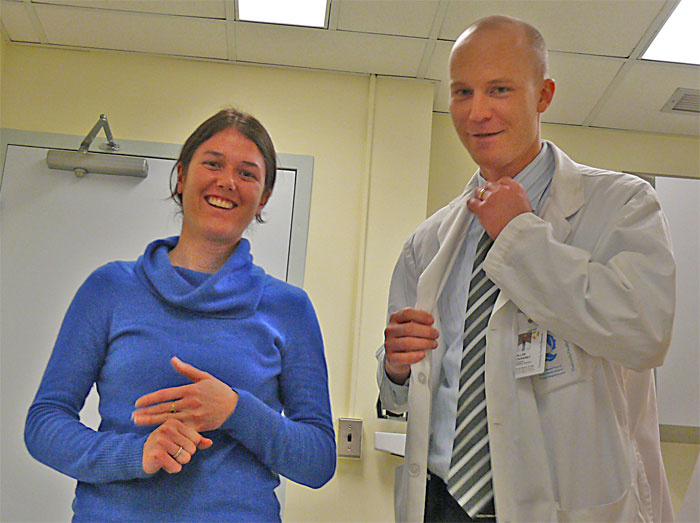SearchUser loginOffice of CitizenRest in Peace,
Who's new
|
A NOBEL FOR SKYPE?Submitted by Jeff Buster on Wed, 03/26/2008 - 16:59.
 Almost every time I post to Realneo I find I am asking myself the same question (which comes from a sense of urgency): is this post what I should be spending my time on? is the subject a priority?
With this post I am sure – the subject is of utmost priority and importance. ____________________________________________________________ Dr. Allan E. Okrainec (at right in photo above) is a laparoscopic surgeon at Toronto Western Hospital in Ontario, Canada. Laparoscopic surgery is done using a remote controlled camera and remote controlled surgical devices which are inserted into the patient through very small “keyhole” sized incisions. There are a number of advantages to laparoscopic surgery, minimal visible scaring being only one of them.
But it is not what Dr. Okrainec does surgically which grabbed my attention. When I caught up with the Doctor and one of his patients (who permitted me to listen in to their consultation), it was the mention of SKYPE which I knew was monumental.
Dr. Okrainec and his colleague Georges Azzieand are using Skype VOIP to teach over the internet. And not classes down the street in Toronto, but in Botswana, Africa. Dr. Okrainec told me that he had visited Botswana several times and loved Africa. Now, from Dr. Okrainec’s office or surgical theater, his hand movements can be seen (using the little computer camera or other digital camera) over the internet.
“With Skype I can now teach surgical technique to doctors in Africa almost for free.”
The Glove and Mail has a story here about Dr. Okrainec’s virtual teaching. _____________________________________ So the ubiquitous telephone line has reached a phenomenal level of communication. Communication that can reach around the globe and be used for any type of education.
How are we in NEO advancing this technology and moving it into every corner of the globe?
I asked Dr. Okrainec if there was any oversight or co-coordinating committee which was in charge of connecting VOIP teachers with students. He didn’t know of any co-coordinating organization. There should be one. Should it be the UN or some of us here in NEO?
I asked Dr. Okrainec about financing for VOIP teaching. Again, he knew of none.
“We are always looking for funding to advance and amplify our teaching”.
How can NEO help make this technology more widely available?
Already, Dr Aniruddha Malpani, a doctor from Bombay, India is blogging about Dr. Okrainec and the economy of teaching real-time with VOIP.
We can level the globe with equitable healthcare and education, and the NOBEL PRIZE committee should consider SKYPE as winner.
( categories: )
|
Recent commentsPopular contentToday's:All time:Last viewed:
Recent blog posts
|
OF WHAT IS PEACE MADE?
In 1997 Jody Williams was co-recipient of the Nobel Peace Prize for her work to obtain a land mine treaty. I remember hearing Ms. Williams on the radio – she credited much of the success in obtaining the land mine treaty to the internet and the ability of the internet to marshal global support behind an idea. Ms. Williams said that “without the internet, we could not have achieved what we did”.
Land mines clearly have a direct link to warfare, so eliminating land mines brings us closer to peace. But for there to be peace, conditions in society must be present that are conducive to peace. Famine, lack of livelihood, and poor health are conditions which make humans desperate – and in desperation warfare can become a choice with better odds for survival than remaining starving, remaining unable to find shelter or sustenance for family, or remaining physically debilitated.
In 2006 the Nobel Peace Prize was awarded to Mohammed Yunus for his Grameen Bank which provided micro loans to Bangladeshis. Starting with loans of $27 Mr. Yunus and the Grameen Bank expanded to providing over 5 Billion Dollars of micro loans , simultaneously creating solidarity groups (of primarily women) to help manage the loan portfolio and eliminate the need for collateral.
Unlike our banking system, which uses cash, real estate, and other “hard goods” as collateral, the Bangladeshis used their friends and their friendship with their friends as “collateral”.
When I heard that the Nobel Committee had awarded the Peace Prize for micro banking – what dawned on me was the brilliance of the Nobel committee’s definition of “peace”. Not only did the micro loans allow hundreds of thousands of Bangladeshis to make a living, the loans networked these persons into support groups of friends.
Skype – and other low cost VOIP technology – combines the internet (which provided so much assistance to Jody Williams ) and the ability to provide “micro” (and macro) health intervention and teaching around the globe.
With the improvement in global health, peace will become a more rationale choice than war.
That’s the peace connection – by improving health war becoms a less desirable choice. For their part in providing the zero cost teaching tool, Skype, like Ms. Williams and Mr. Yunus, should be awarded the Nobel!